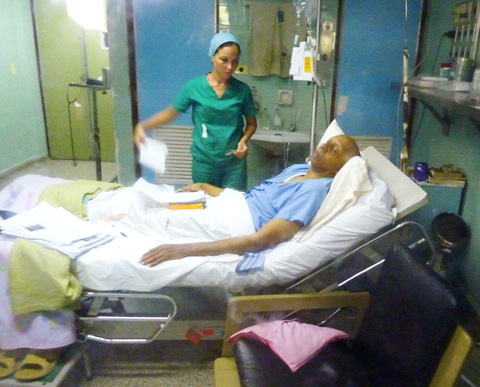A leading Cuban dissident on Thursday ended a 135-day hunger strike after the government said it would free more than 50 political prisoners, raising hopes for improved international ties.
“This confrontation ... has no winners or losers, only Cuba, our nation, has won,” Guillermo Farinas said in a statement presented by his supporters through a hospital window in the city of Santa Clara.

PHOTO: AFP
The frail psychologist has been in intensive care since suffering a hypoglycemic shock two weeks after beginning his protest at the end of February, a day after another dissident, Orlando Zapata, died following an 85-day hunger strike.
Cuba late on Wednesday agreed to free 52 political prisoners in a surprise church-state deal promising the biggest such release since Cuban President Raul Castro formally took power in 2008.
Foreign observers lauded the announcement, with some, including the US and Spain, providing offers of asylum.
US Secretary of State Hillary Rodham Clinton said the step was overdue but “a positive sign,” and many in Europe welcomed the move while calling for the release of all political prisoners.
Farinas had said he would not end his strike until at least five political prisoners were released, having dropped his original demand for 25 to be freed once church mediation was under way.
The first five prisoners, all males aged from 33 to 60, could leave for Spain in the coming days, said the Catholic Church in a statement on Thursday.
Another six were due to be relocated to prisons in their home provinces and those remaining were to be freed within the next three to four months.
The 52 were among 75 dissidents rounded up in 2003 and sentenced to jail terms of six to 28 years.
Talks between Cardinal Jaime Ortega and Castro also involved Spanish Foreign Minister Miguel Angel Moratinos, who said the pending move ushered in “a new era.”
Moratinos said Castro, during their six-hour meeting, had assured him that the exiles and their relatives would be able to return to visit Cuba and that the property of dissidents who leave the country would not be confiscated — measures that would imply a change in Cuban policy.
Cuban’s state-controlled newspapers on Thursday included the announcement of the planned releases, without saying they were political prisoners.
The Church began a dialogue with Havana on May 19. As a result of the talks, one prisoner has been released and another 12 were transferred nearer their families.
US-based Human Rights Watch welcomed the promised releases but warned that more political prisoners could be put in jail.

POLITICAL PATRIARCHS: Recent clashes between Thailand and Cambodia are driven by an escalating feud between rival political families, analysts say The dispute over Thailand and Cambodia’s contested border, which dates back more than a century to disagreements over colonial-era maps, has broken into conflict before. However, the most recent clashes, which erupted on Thursday, have been fueled by another factor: a bitter feud between two powerful political patriarchs. Cambodian Senate President and former prime minister Hun Sen, 72, and former Thai prime minister Thaksin Shinawatra, 76, were once such close friends that they reportedly called one another brothers. Hun Sen has, over the years, supported Thaksin’s family during their long-running power struggle with Thailand’s military. Thaksin and his sister Yingluck stayed

In the sweltering streets of Jakarta, buskers carry towering, hollow puppets and pass around a bucket for donations. Now, they fear becoming outlaws. City authorities said they would crack down on use of the sacred ondel-ondel puppets, which can stand as tall as a truck, and they are drafting legislation to remove what they view as a street nuisance. Performances featuring the puppets — originally used by Jakarta’s Betawi people to ward off evil spirits — would be allowed only at set events. The ban could leave many ondel-ondel buskers in Jakarta jobless. “I am confused and anxious. I fear getting raided or even

Kemal Ozdemir looked up at the bare peaks of Mount Cilo in Turkey’s Kurdish majority southeast. “There were glaciers 10 years ago,” he recalled under a cloudless sky. A mountain guide for 15 years, Ozdemir then turned toward the torrent carrying dozens of blocks of ice below a slope covered with grass and rocks — a sign of glacier loss being exacerbated by global warming. “You can see that there are quite a few pieces of glacier in the water right now ... the reason why the waterfalls flow lushly actually shows us how fast the ice is melting,” he said.

Residents across Japan’s Pacific coast yesterday rushed to higher ground as tsunami warnings following a massive earthquake off Russia’s far east resurfaced painful memories and lessons from the devastating 2011 earthquake and nuclear disaster. Television banners flashed “TSUNAMI! EVACUATE!” and similar warnings as most broadcasters cut regular programming to issue warnings and evacuation orders, as tsunami waves approached Japan’s shores. “Do not be glued to the screen. Evacuate now,” a news presenter at public broadcaster NHK shouted. The warnings resurfaced memories of the March 11, 2011, earthquake, when more than 15,000 people died after a magnitude 9 tremor triggered a massive tsunami that